Food supplements: what to look out for
BVL advocates careful handling of food supplements and gives tips on how to buy them safely - especially online
On the occasion of World Consumer Day, the Federal Office of consumer protection and food Safety (BVL) advises responsible use of food supplements. They can be a useful supplement for population groups with nutrient deficiencies. Anyone buying food supplements should bear a few important points in mind, especially when buying online.
Healthy people who eat a balanced and varied diet generally do not need food supplements. However, for some population groups that do not get sufficient amounts of certain nutrients such as vitamin D, calcium, folic acid or iodine from their diet, supplementing with vitamin or mineral supplements can be useful.
Food supplements are not medicines
Food supplements are foodstuffs and may only be sold in small portion sizes such as capsules, pastilles or liquid ampoules. This means that they are sometimes externally similar to medicines. Unlike these, however, food supplements are not suitable for treating illnesses. This also means that food supplements may neither be presented like medicines nor advertised with claims that aim to alleviate, eliminate or prevent illnesses.
What to look out for when buying food supplements
If you want to take food supplements, you should find out about unknown ingredients before buying them. You should be just as wary of unrealistic promises of success as you should be of vague consumption recommendations. Possible interactions with medicines should also be taken into account. You should therefore seek the professional advice of a doctor or pharmacist before buying dietary supplements.
Caution is advised with products that are sold exclusively on the internet. This also applies to "experience reports" from discussion forums and chat rooms, as they often turn out to be advertising in disguise. If you buy food supplements from online retailers, you should only do so from suppliers who are registered with the local food supervisory authority. They can be recognized, for example, by the Initiative D21 seal of approval. Anyone ordering from mail-order pharmacies should check the mail-order register to see whether they are registered there.
Food supplements from abroad may be considered medicinal products in Germany under certain circumstances. Import is then prohibited. Customs could confiscate the goods and the purchaser could face charges.
Food supplements must be reported to the BVL
The manufacturer, distributor or importer of a food supplement is responsible for ensuring that it is safe, that it fully complies with the requirements of food law and that consumers are not misled by its presentation and advertising. If a new product is placed on the market, it must be notified to the BVL. The BVL immediately forwards such notifications to the highest food monitoring authorities of the federal states, which are responsible for monitoring the respective manufacturer, distributor or importer.
To date, almost only vitamins and minerals have been specifically regulated by law as permitted ingredients in food supplements. For all other substances such as plants or plant extracts, there are no such regulations, with a few exceptions. The BVL is therefore working together with representatives of the authorities and external experts from Germany, Austria and Switzerland to draw up the so-called substance lists. As a guide, they contain information and recommendations on the classification and use of these substances. The plant list with approx. 900 entries, the mushroom list with approx. 300 entries and a foreword to these lists can be downloaded from the BVL website. An algae list with approx. 80 entries will follow shortly.
The BVL also provides further information on food supplements and useful tips for safe online shopping on its website.
Note: This article has been translated using a computer system without human intervention. LUMITOS offers these automatic translations to present a wider range of current news. Since this article has been translated with automatic translation, it is possible that it contains errors in vocabulary, syntax or grammar. The original article in German can be found here.
Other news from the department science
Most read news
More news from our other portals
See the theme worlds for related content
Topic world Food safety
Food safety is at the heart of the food and beverage industry. It ensures that the food we eat every day is not only nutritious, but also free of harmful contaminants. From field to plate, the industry monitors and regulates every step of the process with strict quality controls, advanced testing methods and continuous research.

Topic world Food safety
Food safety is at the heart of the food and beverage industry. It ensures that the food we eat every day is not only nutritious, but also free of harmful contaminants. From field to plate, the industry monitors and regulates every step of the process with strict quality controls, advanced testing methods and continuous research.
































































